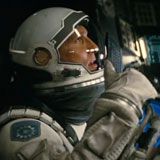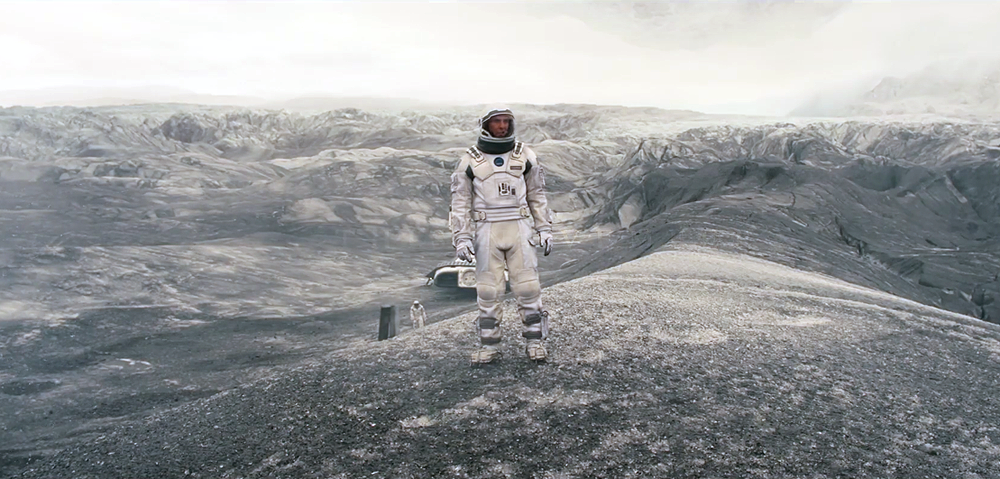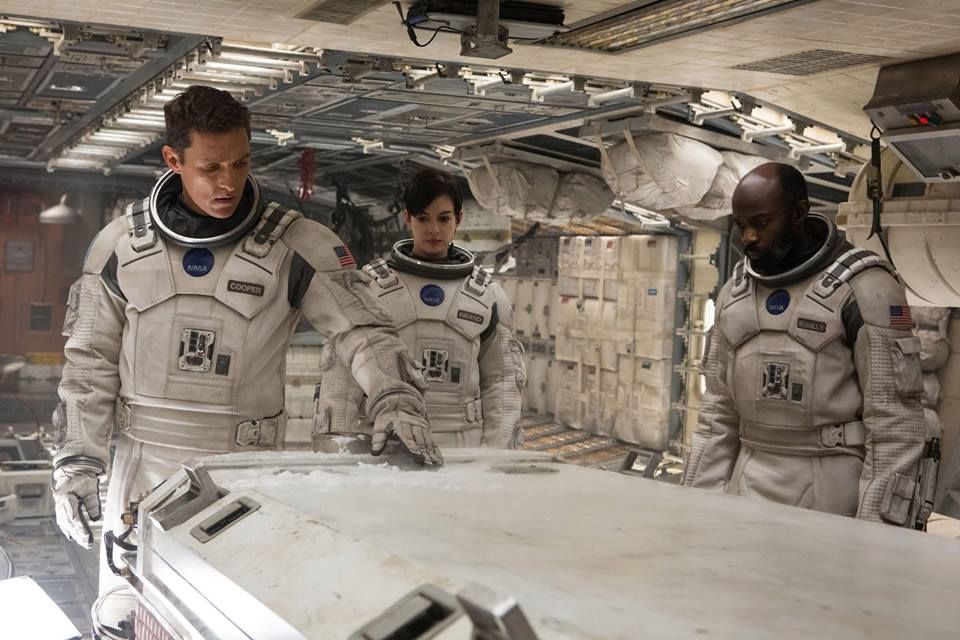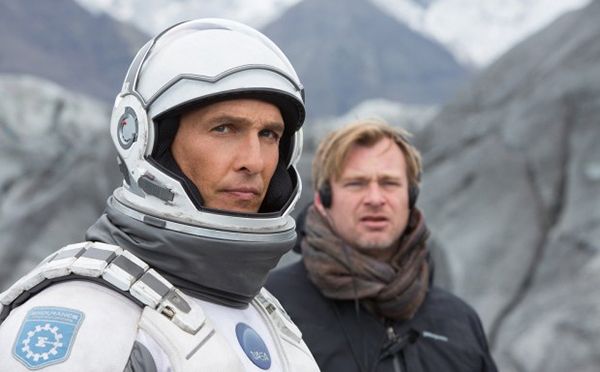The team behind Interstellar has zealously guarded its secrets, but after viewing one of the trailers, it should come as no surprise that, at its core, the sci-film is about humanity, outer space and the relationship between the two.
While director Christopher Nolan’s film centers on the personal dynamics between its characters – most notably, those played by Matthew McConaughey, Anne Hathaway and Jessica Chastain – it’s also about exactly where they (and, by proxy, the human race) are going in terms of space travel and why the stars still seem to beckon us.
Opening Friday nationwide, Interstellar stars McConaughey as single father Cooper, an engineer and pilot who becomes a farmer in the wake of a global food crisis. Recruited by his mentor (Michael Caine), he joins a space mission to find another planet capable of sustaining human life.
During a recent press conference, the filmmakers and stars reflected on the link between humanity and space, and how looking back informed their sense of moving forward.
Christopher Nolan: I think really space exploration to me has always represented the most hopeful and optimistic endeavor that mankind has ever really engaged with. I think I was certainly struck when they flew the Space Shuttle [Endeavor] and the 747 at the Science Center here in LA, and Emma and I were up in Griffith Park with hundreds of people who were waving flags, watching this thing fly down. It was a very moving moment, actually – a little melancholy at the same time, because what you felt was that sense of that great endeavor, a great collective endeavor, the hope, the optimism, it's something that feels like we're in need of again. I feel very strongly that we're at a point now where we need to start looking out again and exploring our place in the universe more.
Emma Thomas, producer: I love the fact that this is a project that deals with the excitement and the adventure of space travel, but at the same time, has a very intimate story and is very much sort of relatable. So now, I find as a parent and, frankly, just as a human being, I love the ideas, the big questions that are posed. And things that are on the face of it might seem to be somewhat depressing – I mean, the idea that this Earth which we love, I mean, it's just an incredible place – on the face of it, it's a film or a story about us having to leave the Earth would be sort of a depressing one, but it's actually, the thing that Jonah's [co-writer Jonathan Nolan] draft had and Chris continued with: There's a real hope to it, and there's a real sense of what we have as humanity that is unlike any other species, which is the resourcefulness and sense of adventure and resilience. And I found that to be an incredibly exciting proposition.
Jonathan Nolan Reflects on Almost Making "Interstellar" With Spielberg
Matthew McConaughey: One of the things I got from this film is that mankind's expectations have to be greater than ourselves. And the further out there we go, the more we find out and learn that it's about you and me, right here. So it's much more of a tangible idea, an attainable thought. I'm in no way an expert on it. I can have conversations about it now that I couldn't have a year ago before getting in this film. But it's now a much more of an eventuality, as far as like where we're going and which way to look what that new frontier is.
Jessica Chastain: I remember when I was a kid, my first real confrontation with space travel was when the Challenger exploded. And I remember how traumatic that was for me because I'd been watching on the news, and all the children in [teacher/astronaut Christa McAullife’s] class were watching. And I was very young. So I never, ever imagined that it was something I wanted to do. I think that we, as human beings, need to always conquer our fears and reach beyond our grasps. I think it's very important that we don't become complacent and stagnant. But the wonderful thing about becoming an actress, not necessarily this one, but I get to act those explorations beyond which, I, myself, am physically capable of.
Anne Hathaway: One of my first experiences with the space program was with the memorial that was built for the Challenger. When I was in seventh grade, my class spent the entire school year preparing to launch a spaceship, all together. And we all had our different jobs that we had learn how to do. We learned the math that you needed, the practical skills that you needed. I thought that was really cool, and so I think that if you can take a tragedy and turn it and find the gold in it and turn it into something positive, that's great. And I'm hoping that the suspension of the space program is just that: a suspension, and that it's not the final say in the matter, because I think we need it.
Hans Zimmer on His "Interstellar" Leap of Faith
Nolan: One of our greatest resources was IMAX and their relationship with NASA because over the last 30 years, they have the same cameras we used to shoot the film. They've gone into space. They've been in low Earth orbit. They shot at International Space Station, the repairs on the Hubble. They have all these things, and they have this incredible library of great films from filmmakers like Toni Myers put together. So one of the first things I did is I got the director of photography, the production designer, the visual effects supervisor – we rented a big IMAX screen and projected these films all in one day and watched as many of them as we could to immerse ourselves in the detail of it, the feeling of it. With Toni Myers, actually, we had a lot of good conversations with her and she put me in touch with Marsha Ivins, who has been to space five times and was a helpful resource for myself and also for the actors. And so we tried to get the feeling of the details being correct. We tried to get the appropriate textures of what this kind of spacecraft needed to be. That weird tension between the physical intimacy and the spaceship and the fragile nature of the industrial quality of it, and then the cosmic scale of where it's going. We tried to always play that. And we were certainly happy when Marsha came to visit the set and was quite impressed. It felt quite credible to her. So that was a bit of a sigh of relief.
Thomas: For me, I don't know if you've gone on the NASA website, but there's a genius thing where they show a picture every day … One of the pictures that they showed which I just found to be absolutely incredible was taken somewhere from, I think, near Saturn of the Earth, and it was this tiny little blue dot. And it's absolutely incredible to look at that and think “Oh, my gosh, that's us!” And it's not even taken from that far away. I mean, when you think about the sort of near relative distances we're talking about when we talk about our universe. And it made me feel like “When you look at the stars in the sky, and they all look like that, there has to be something else out there. There has to be. How could there not be?” That's what I felt, anyway.
Nolan: The reason I'm a filmmaker, really is to tell stories, so you hope that it will have resonance to people for the kind of things you're talking about…We're saying in our story mankind is being gently nudged off the planet by the Earth, itself. And the reason is non-specific because we really didn't want to be too didactic or political about it. It's not really the point, for me because my excitement about the project was addressing a potentially extremely negative idea that is out there in terms of the planet, having nothingness. Jonah suggesting we go somewhere else, but that being a great opportunity; that being a great, exciting adventure to be on something I found very winning about it.




